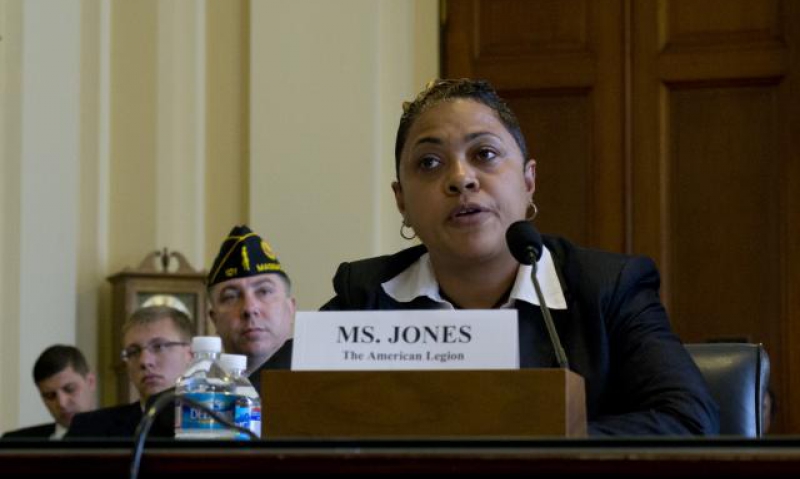
The Legion testifies on several House measures that would improve VA’s claims process.
On June 28, Verna Jones, director of The American Legion’s Veterans Affairs & Rehabilitation Division, testified before the House Veterans’ Affairs Subcommittee on Disability Assistance and Memorial Affairs in favor of several bills related to the disability claims backlog — the number of which the Department of Veterans Affairs (VA) has recently whittled down to about 520,000.
The American Legion also submitted written testimony that highlighted its support for five measures related to VA’s disability claims process.
The Ending VA Claims Disability Backlog and Accountability Act (H.R. 2138), directs the VA Secretary "to resolve the backlog of disability claims," which the department intends to do by Memorial Day of 2015. VA also plans to achieve a 98 percent accuracy rate in processing claims by the same date.
Noting VA’s recent achievement of resolving – in 60 days – all claims that had been pending for two years or longer, the Legion asked why these practices were not employed earlier. And since these claims were adjudicated so rapidly, does the Veterans Benefits Administration (VBA) "feel confident in the accuracy?"
H.R. 2138 directs the VA Secretary to provide tangible metrics to ensure that VBA meets the goal of eliminating the backlog, and calls for records required from other federal agencies to be quickly transferred to VA for use in claims adjudication. Enacting this provision should reduce the wait-time that VA experiences when other agencies fail to respond in a timely manner. The bill also calls for a comprehensive training program for claims adjudicators.
In August 2012, The American Legion passed a resolution urging Congress to pass legislation that would require VA to be held accountable for its stated goal to eliminate the claims backlog with 98 percent accuracy by 2015. H.R. 2138 would aid in achieving this objective.
Two House measures seek to improve VA accountability in claims processing: the VA Claims Efficiency Through Information Act (H.R. 1623) seeks "to make publicly available certain information about pending and completed claims for compensation;" and H.R. 1809 would direct VA "to provide notice of average times for processing claims and percentage of claims approved."
The American Legion supports these two bills, which would add greater transparency to VBA operations. Its August 2012 resolution also seeks to have VA report "the number of claims for compensation and disability that were submitted, that were granted/awarded, that were denied and that remain in a pending status."
H.R. 1809 also mentions the filing of fully developed claims (FDCs) by veterans to receive benefits. The Legion has worked closely with White House and VA staff on the FDC program, as well as with several VA regional offices. A report of the Legion’s findings will be released later this year.
In many claims cases, the Legion has seen striking differences in processing times between FDCs and traditional claims. Helping veterans to better understand what their best options are in pursuing claims will help not only them, but also VA as claims are routed more efficiently.
Two other Legion-backed bills related to disability claims are the Pay As You Rate Act (H.R. 2086) and the Disabled Veterans’ Access to Medical Exams Improvement Act (H.R. 2423).
H.R. 2086 would direct VA to make interim payments of disability compensation benefits for certain claims before they are fully adjudicated. This legislation would give disabled veterans access to health care and benefits more quickly.
While VA has the authority to grant individual issues and defer decisions on other issues currently pending, this is seldom done. According to findings from the Legion’s Regional Office Action Review (ROAR) visits to VA regional offices, the reason is often because employees do not get credit for such split and deferred decisions, so it goes against their incentive to devote the time to writing a decision for which they won’t receive work credit.
Receiving disability benefits more quickly, even by a small amount, can often be the difference between making ends meet or falling into dire financial straits. Furthermore, receiving a service-connected disability rating gives a veteran faster access to health care. The sooner veterans can receive treatment, the better they can mitigate the negative effects of their disabilities.
H.R. 2423 would improve the VA Secretary’s authority to enter into contracts with private physicians to conduct Compensation & Pension (C&P) exams. In many regions, contract examinations through outside parties to perform these C&P examinations are a vital component in ensuring that VA has the resources to meet demands in local areas. If such contracting authority were to expire, an already overstressed system would be further taxed.
Two other Legion-supported measures addressed at the hearing include:
-
World War II Merchant Mariner Service Act (H.R. 1288): Directs the Secretary of Homeland Security "to accept additional documentation when considering the application for veterans status of an individual who performed service as a coastwise merchant seaman during World War II."
-
Blue Water Navy Ship Accountability Act (H.R. 1494): Directs the Secretary of Defense to review the operation of certain ships during the Vietnam Era.
- Legislative

